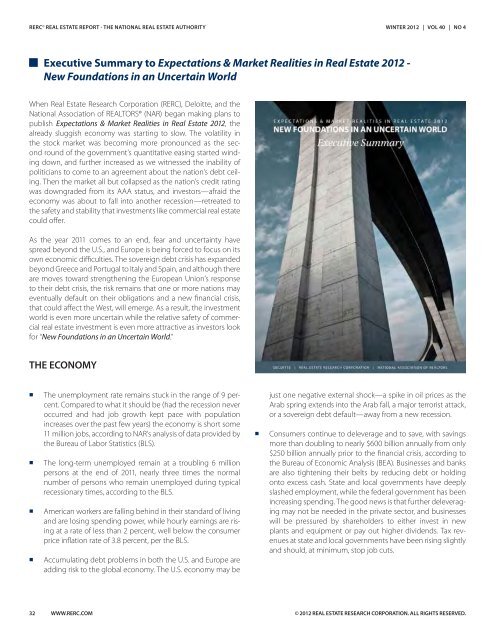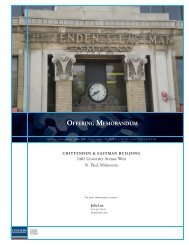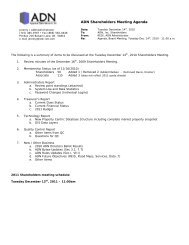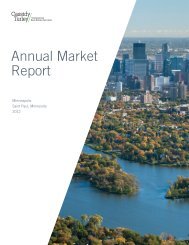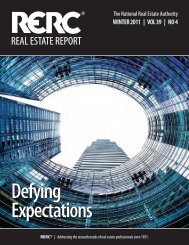RERC Real Estate Report - REDI-net.com
RERC Real Estate Report - REDI-net.com
RERC Real Estate Report - REDI-net.com
- TAGS
- rerc
- real
- estate
- redi-net.com
You also want an ePaper? Increase the reach of your titles
YUMPU automatically turns print PDFs into web optimized ePapers that Google loves.
<strong>RERC</strong> © REAL ESTATE REPORT - THE NATIONAL REAL ESTATE AUTHORITY<br />
Executive Summary to Expectations & Market <strong>Real</strong>ities in <strong>Real</strong> <strong>Estate</strong> 2012 -<br />
New Foundations in an Uncertain World<br />
When <strong>Real</strong> <strong>Estate</strong> Research Corporation (<strong>RERC</strong>), Deloitte, and the<br />
National Association of REALTORS® (NAR) began making plans to<br />
publish Expectations & Market <strong>Real</strong>ities in <strong>Real</strong> <strong>Estate</strong> 2012, the<br />
already sluggish economy was starting to slow. The volatility in<br />
the stock market was be<strong>com</strong>ing more pronounced as the second<br />
round of the government’s quantitative easing started winding<br />
down, and further increased as we witnessed the inability of<br />
politicians to <strong>com</strong>e to an agreement about the nation’s debt ceiling.<br />
Then the market all but collapsed as the nation’s credit rating<br />
was downgraded from its AAA status, and investors—afraid the<br />
economy was about to fall into another recession—retreated to<br />
the safety and stability that investments like <strong>com</strong>mercial real estate<br />
could offer.<br />
As the year 2011 <strong>com</strong>es to an end, fear and uncertainty have<br />
spread beyond the U.S., and Europe is being forced to focus on its<br />
own economic difficulties. The sovereign debt crisis has expanded<br />
beyond Greece and Portugal to Italy and Spain, and although there<br />
are moves toward strengthening the European Union’s response<br />
to their debt crisis, the risk remains that one or more nations may<br />
eventually default on their obligations and a new financial crisis,<br />
that could affect the West, will emerge. As a result, the investment<br />
world is even more uncertain while the relative safety of <strong>com</strong>mercial<br />
real estate investment is even more attractive as investors look<br />
for “New Foundations in an Uncertain World.”<br />
THE ECONOMY<br />
n The unemployment rate remains stuck in the range of 9 percent.<br />
Compared to what it should be (had the recession never<br />
occurred and had job growth kept pace with population<br />
increases over the past few years) the economy is short some<br />
11 million jobs, according to NAR’s analysis of data provided by<br />
the Bureau of Labor Statistics (BLS).<br />
n The long-term unemployed remain at a troubling 6 million<br />
persons at the end of 2011, nearly three times the normal<br />
number of persons who remain unemployed during typical<br />
recessionary times, according to the BLS.<br />
n American workers are falling behind in their standard of living<br />
and are losing spending power, while hourly earnings are rising<br />
at a rate of less than 2 percent, well below the consumer<br />
price inflation rate of 3.8 percent, per the BLS.<br />
n Accumulating debt problems in both the U.S. and Europe are<br />
adding risk to the global economy. The U.S. economy may be<br />
32 WWW.<strong>RERC</strong>.COM<br />
WINTER 2012 | VOL 40 | NO 4<br />
just one negative external shock—a spike in oil prices as the<br />
Arab spring extends into the Arab fall, a major terrorist attack,<br />
or a sovereign debt default—away from a new recession.<br />
n Consumers continue to deleverage and to save, with savings<br />
more than doubling to nearly $600 billion annually from only<br />
$250 billion annually prior to the financial crisis, according to<br />
the Bureau of Economic Analysis (BEA). Businesses and banks<br />
are also tightening their belts by reducing debt or holding<br />
onto excess cash. State and local governments have deeply<br />
slashed employment, while the federal government has been<br />
increasing spending. The good news is that further deleveraging<br />
may not be needed in the private sector, and businesses<br />
will be pressured by shareholders to either invest in new<br />
plants and equipment or pay out higher dividends. Tax revenues<br />
at state and local governments have been rising slightly<br />
and should, at minimum, stop job cuts.<br />
© 2012 REAL ESTATE RESEARCH CORPORATION. ALL RIGHTS RESERVED.


